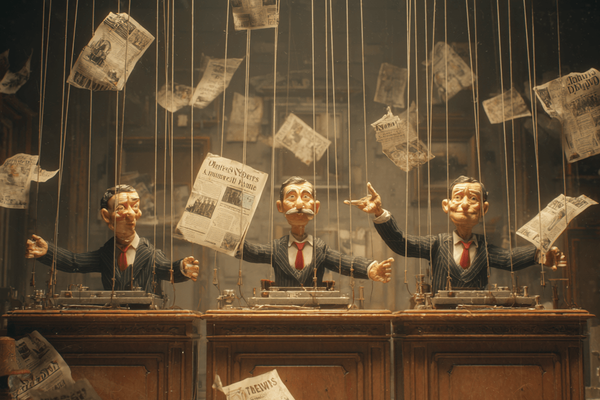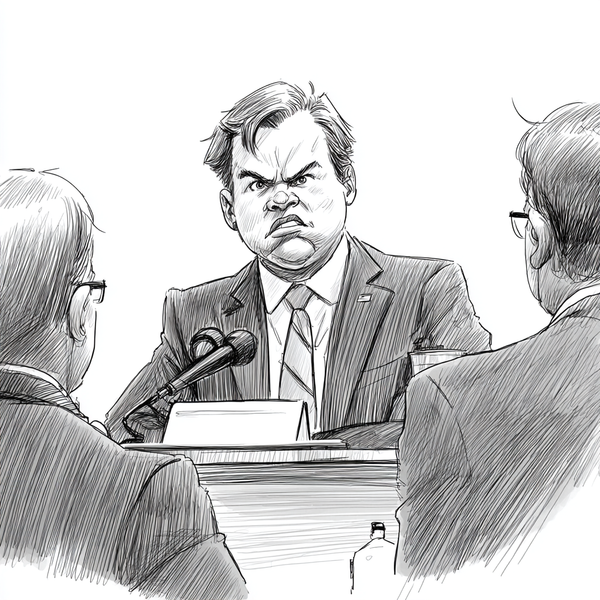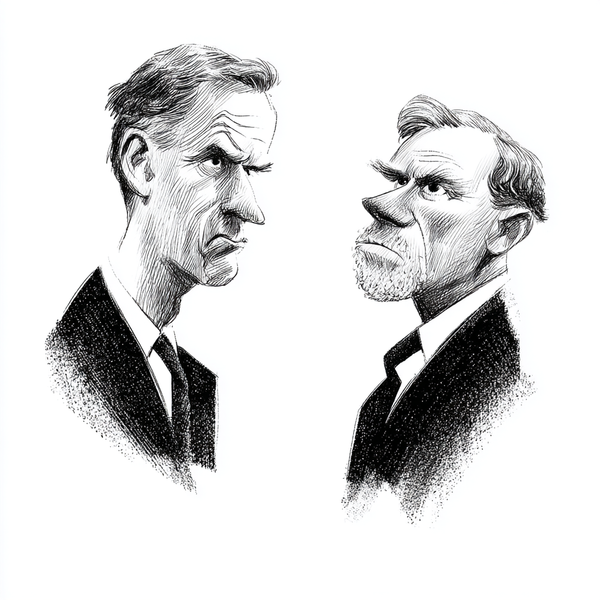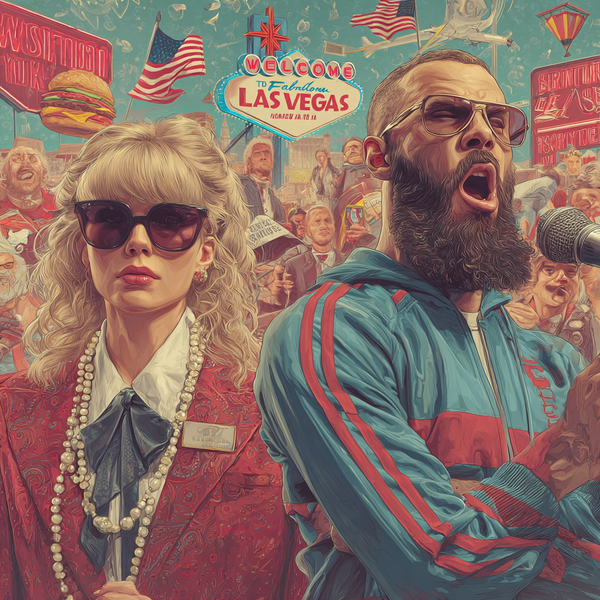Taylor Swift has always functioned as a cultural mirror. During her years with Joe Alwyn, she slipped into a quieter register: Folklore and Evermore arrived with muted palettes, lowercase song titles, and an almost literary sensibility. The relationship itself was private, understated, and European-tinged. It was a moment when Swift — and perhaps America, through her seemed to crave subtlety, introspection, and restraint.
Those albums weren’t just a stylistic detour; they were cultural products of their time. Released in the depths of the pandemic, they resonated globally because they whispered when the world was overwhelmed by noise. Acoustic guitars, muted cardigans, hushed lyrics about imagined characters, it was escapism through quietness. Folklore and Evermore became symbols of an alternative America, one that still knew how to retreat into reflection and restraint.
Her relationship with Travis Kelce signals something very different. The defining image came not in a song, but in a Super Bowl post-game moment: Kelce, hoarse with adrenaline, shouting Elvis Presley’s “Viva Las Vegas” into a live broadcast microphone. There was nothing polished about it. It was raw, loud, and frankly, messy — a kind of celebratory spectacle that felt worlds away from the stillness of Folklore.
Kelce doesn’t invent this style of expression; he embodies it. This is an America comfortable in its loudness: the NFL stage, beer-soaked celebrations, Vegas showmanship, karaoke at stadium volume. Joy is not whispered but shouted.
Americana culture thrives on spectacle: Fourth of July fireworks that rattle windows, monster truck rallies, Las Vegas residencies, and political rallies where volume is equated with conviction. In this script, Kelce is not an anomaly; he is a perfect archetype.
When Swift stands beside him, she aligns, at least publicly, with this archetype. To some, it feels like betrayal: the artist once associated with quiet self-reflection is now tethered to the excess of Vegas spectacle. To others, it feels like a revealing truth. Perhaps the quiet Taylor was a brief detour, and the loud Taylor — the stadium-filling, flag-bearing, all-American pop icon — is the more authentic version after all.in terms of
This contrast isn’t just about celebrity romance; it reflects a broader cultural shift.
During the Obama years, political and cultural life were often framed in terms of Michelle Obama’s phrase, “When they go low, we go high,” which captured an aspiration toward dignity. Even in disagreement, there was an insistence on restraint, a belief that politics and culture could be elevated by grace under pressure. Barack Obama’s 2008 speech in Berlin, addressed to a crowd of 200,000, was a model of this tone: lofty, internationalist, and deliberately restrained.
Compare that to today. We live in an age where decorum feels antiquated. Donald Trump’s rise didn’t just change politics; it rewired the cultural register. Nicknames like “Crooked Hillary” and “Sleepy Joe” spread faster than any policy proposal. Political rallies became performance art, closer to a pro-wrestling event than a town hall. Social media rewarded the loudest, sharpest insult over the most measured argument.
The shift bleeds everywhere:
- In politics: from “hope and change” to “lock her up.”
- In first ladies: from Michelle Obama’s call for higher ground to Melania Trump’s Rose Garden renovation, remembered as subtraction, not inspiration.
- In public life, members of Congress live-tweeting insults, shouting during State of the Union speeches, or fundraising off viral outrage clips.
Culture followed politics. The line between statesmanship and spectacle eroded, and the language of dignity gave way to the currency of volume.
Seen this way, Kelce’s microphone moment wasn’t just a football player celebrating. It was emblematic of an American culture where volume substitutes for depth, and performance has overtaken composure. His Elvis shout was the Super Bowl equivalent of a political rally chant: unsubtle, unforgettable, undeniably loud.
International audiences notice this shift. Folklore was widely praised abroad as Swift’s artistic renaissance, an album that seemed to transcend American celebrity culture and speak in a universal, timeless register. With Kelce, she’s absorbed into a different image: not the subtle artist in the woods, but the figurehead of loud, unapologetic Americana.
Both versions are real. Both are American. One whispers, the other shouts.
To Europe, Folklore was Swift’s artistic high point, proving that even in America, there was room for subtlety. With Kelce, the story reads differently: the pop star queen tethered to the football king, parading through stadiums in a romance written like a Bud Light commercial. In Asia and Latin America, commentary has oscillated between fascination and discomfort: a reminder that America remains loudest when performing itself.
The Taylor–Travis pairing looks, on the surface, like a fairy tale: the world’s pop star and America’s football hero. She is cast as your English teacher, he’s your high school gym teacher, and together they sell an illusion of normalcy.
But the reality couldn’t be further. Taylor is a billionaire with a private jet schedule tighter than Air Force One, flanked by bodyguards who outnumber most school security staff. Travis is a multimillionaire athlete who sprays champagne from the Lombardi trophy while Vegas turns the lights up for him.
Meanwhile, the actual English teacher in Kansas is paid near minimum wage, stockpiling glue sticks from Walmart, and practicing gun drills with children because America cannot legislate safety. The real gym teacher is running DoorDash shifts after practice to cover rent.
The Swift–Kelce love story is sold as “relatable America,” but it’s the opposite: billionaires cosplaying as the working class. The fairytale is a distraction, a performance staged to reassure us that everything is normal, while the real story, wealth hoarded at the top, precarity everywhere else, never makes it to the broadcast mic.
And this may be where American culture is heading next. Not just loudness, but camouflage through performance: billionaires hoarding wealth while presenting themselves as the couple-next-door.
We already see the prototypes:
- Elon Musk eating fast food on camera, as if McDonald’s fries cancel out a net worth that eclipses small countries.
- Mark Zuckerberg, in a backyard barbecue apron, live-streaming himself smoking brisket, while running a tech empire accused of destabilizing democracies.
- Jeff Bezos donning cowboy hats and riding rockets, performing Americana cosplay as if private space launches were a county fair stunt.
Taylor and Travis slot neatly into this script. She plays the English teacher, he plays the gym teacher, and together they sell a storybook romance while their actual lives are buffered by wealth most Americans cannot fathom.
If Folklore whispered and Kelce shouted, the next chapter of American culture may do both: whispering relatability while shouting distraction. Your English teacher marries your gym teacher, but in the billionaire version — one with Gulfstreams, Rolexes, and bodyguards — while the real teachers are eating lunch in their cars and rehearsing how to keep children alive. The show is loud, the wealth is quiet, and the silence is the most American thing of all.
Written by










